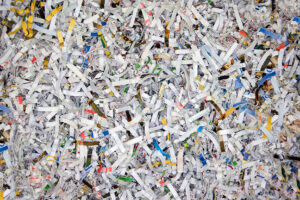In the healthcare industry, safeguarding sensitive patient information and maintaining confidentiality is paramount. As healthcare providers, you handle an abundance of paperwork, documents, and records that contain sensitive data. This is where reliable shredding services come into play, offering a secure and efficient solution for disposing of confidential information. In this article, we will explore the importance of shredding and provide guidance on how healthcare providers can find a trustworthy shredding service.
The Importance of Shredding
Shredding plays a critical role in ensuring the security and privacy of patient information, as well as protecting your healthcare practice from data breaches and legal liabilities. Here’s why shredding is so important:
- Patient Privacy: Healthcare providers are bound by laws such as the Health Insurance Portability and Accountability Act (HIPAA) to protect patient privacy. Shredding ensures that sensitive patient records and information are destroyed beyond recovery.
- Legal Compliance: Non-compliance with data protection regulations can result in hefty fines and damage to your reputation. Shredding helps you stay compliant with regulations such as HIPAA, the Gramm-Leach-Bliley Act (GLBA), and state-specific laws.
- Preventing Identity Theft: Shredding prevents identity theft by making it impossible for sensitive information like Social Security numbers, financial records, and medical histories to be pieced together from discarded documents.
- Protecting Reputation: A data breach can tarnish your practice’s reputation. Patients trust healthcare providers to keep their information confidential. Proper shredding demonstrates your commitment to their privacy.
How to Find Reliable Shredding Services
Finding a trustworthy shredding service is crucial to ensure the secure disposal of confidential documents. Here are steps to help healthcare providers find a reliable shredding service:
- Assess Your Needs: Determine the volume of documents you need to shred and how often. Some providers offer on-demand services, while others offer scheduled pickups. Understanding your needs will help you choose the right service.
- Check for Certification: Look for shredding services that are certified and compliant with industry standards and regulations. The National Association for Information Destruction (NAID) is a respected organization that certifies shredding service providers.
- Security Measures: Inquire about the security measures the shredding company employs. This should include secure collection containers, strict chain-of-custody procedures, and background checks on personnel who handle your documents.
- References and Reputation: Ask for references from other healthcare providers who have used the shredding service. Online reviews and testimonials can also provide insights into a company’s reputation.
- Cost Transparency: Obtain detailed pricing information upfront to ensure there are no hidden fees. Understand how the pricing structure works, whether it’s based on volume, frequency, or other factors.
- Compliance Documentation: A reputable shredding service provider should provide you with certificates of destruction after each shred. These certificates prove that your documents were destroyed in compliance with legal requirements.
- Environmental Responsibility: Inquire about the shredding company’s commitment to environmental responsibility. Some providers offer recycling services for shredded paper, which aligns with sustainability goals.
- Customer Service: Evaluate the level of customer service offered by the shredding service. Responsive and helpful customer support can make a significant difference in your experience.
- Legal Agreements: Review the service agreement carefully. Ensure it covers all aspects of your shredding needs, including security, compliance, and liability.
Conclusion
In today’s data-driven world, safeguarding patient information is of utmost importance for healthcare providers. Reliable shredding services provide a secure and compliant solution to protect sensitive data, maintain legal compliance, and preserve patient trust. By following these guidelines and thoroughly vetting potential shredding service providers, healthcare practices can ensure that their confidential information is handled with the utmost care and security, allowing them to focus on providing quality care to their patients with peace of mind.










